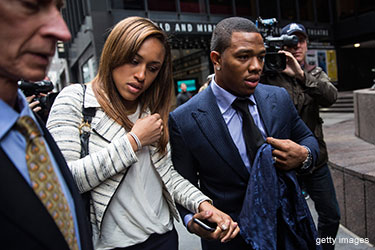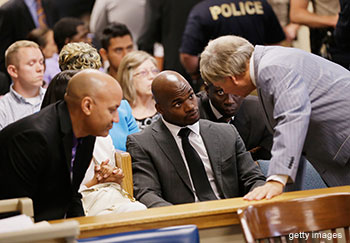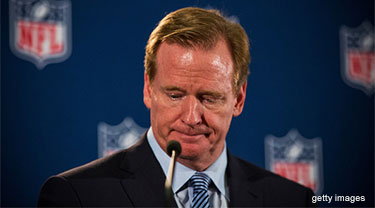Three months ago, a wave of scandals hit the NFL. Its fans and non-fans demanded change.
People that didn't even follow football were eager to decry the sport and its governing bodies, assaulting them with criticisms of barbarism and rampant negligence. Football was broken, its reputation was in shambles, and its future -- as the media frenzy suggested -- was in peril.
If you took that widely circulating observation word-for-word, you probably didn't see things working out the way they have. The state of professional football is quite a bit better off than many likely expected or hoped.
Give some of the credit to the league itself. The NFL has taken many steps to reconcile with a disgruntled society. It has established a four-female domestic violence committee to chime in on the league's domestic violence policy. It has admitted fault -- with great difficulty, it's worth noting, and only after an absurd amount of pressure was applied -- for its prior mismanagement of Ray Rice and similar player conduct situations.
The league has launched a PSA campaign that directly addresses domestic violence. And Goodell himself has even said he would be willing to relinquish his authority in punishing players.
Each time one of these steps have been taken, the same familiar questions have been tossed around. Will this be enough to repair the league's image? Will fans forgive the NFL?
And so here we are three months later, with a supposedly reformed NFL that says it has learned its lesson. Fans and the media are ready to buy the narrative, kiss and make up. Somehow the mass plagues of the NFL, its players and its fans were miraculously healed, and I missed it.
I don't know if the NFL has changed in the past three months. All I know is this: We're not asking the same questions anymore. And we're not demanding answers.
Adrian Peterson is the last unsolved variable in a formula that's grown all too familiar.
The formula goes a little something like this: First, take a large, wealthy organization and get it hellbent on maximizing profits. Insert ethical dilemmas that are pushed to the side so that the view of oncoming profits isn't obstructed.
(If you're having trouble conceptualizing this formula, insert major banking institutions circa 2008 as the wealthy organizations, and relaxed mortgage lending practices as the ethical dilemma.)
Now the critical ingredient: Public awareness. Without public awareness, the wealthy organization proceeds as usual. But when the public learns of ethical concerns, it tends to react. And the wealthy organization is forced to adjust course -- if not for legal consequences, then surely to maintain the business of those consumers.
I won't pretend to be an expert in economics, but this strikes me as an absurd fallacy -- one that benefits the wealthy organizations greatly. Today's culture is one that loves to be outraged -- our social networks are built to accommodate insincere gesticulating. There's so much satisfaction in being a part of the outcry.
The NFL knows this. It understands that fans have short memories, that they want to give the league the benefit of the doubt, and that the product of football is too alluring for most fans to abstain from, even temporarily.
Outcry is the best things those fans have. And the reason is simple: For as terrible as it was that Roger Goodell needed two different security tapes to punish Ray Rice, and as absurd as it was that the league funded the production and publication of biased research that obscured the true threat of concussions to football players, the intrigue of games proves irresistible. The Raiders are still playing on Sunday? Hey, they just might get lucky and beat the 49ers. (They did.)

This isn't like shopping at Target when Wal-Mart makes you mad. There is no substitute for NFL football. For fans to take a tangible stand, it's got to outweigh the love for the game. The NFL could get away for murder -- and some would say, based on the chronic traumatic encephalopathy afflicting its current and former players, it has -- and fans would still watch.
All the NFL needs to do is provide a modicum of evidence that it is trying to reform itself, just enough to keep the activists and politicians off their case and out of their way. If the league can do that, he fans will be of no concern. You'll find them in the same place every Sunday.
This is where Adrian Peterson enters the equation. Right now, the Vikings running back is in purgatory. He has no idea when the NFL will let him back in, if ever. After reaching a plea deal in a child abuse case in Texas -- where he was charged with applying corporal punishment to his four-year-old through a switch -- Peterson appeared to be ready to return from an indefinite suspension.
The NFL had other plans, suspending him indefinitely and saying he couldn't apply for reinstatement until mid-April. But there are now suggestions that Peterson was promised by NFL executive Troy Vincent that he would only be given a two-game suspension.
In response, Peterson has filed a federal lawsuit against the league.

Whether or not Peterson deserves his punishment is beside the point. In Peterson, the NFL holds one last wild card that hasn't been laid on the table. Ray Rice won his appeal of an indefinite suspension by Goodell -- an action the arbitrator termed "an abuse of discretion."
Rice is free and clear to join another NFL team. Peterson, though, remains firmly in the league's control. Based on the evidence, it appears the league is unhappy that Peterson did not play the part as directed by the NFL in moving toward reinstatement for the league.
For that, Goodell came down hard.
Who knows what happens to Adrian Peterson -- if his case makes it all the way to federal court, or if he and the NFL come to an agreement on their own. Whatever might come down the pike, we can say right now, with reasonable assurance, that the reason Adrian Peterson is not playing football has nothing to do with child abuse anymore.
This is about power now. This is about the NFL's determination to win.
The NFL is fine. In fact, it's great.
Maybe Goodell has has to endure some strong words from critics. Troy Vincent had to stand in front of the U.S. Senate so politicians could frown at him. Anheuser-Busch, along with a handful of other sponsors including McDonald's, Campbell's Soup and Visa, let the NFL know it wasn't happy with all the bad press.
But they didn't do anything about it.

By the end of October, TV ratings were in the clear. Sunday viewership had dipped slightly, but Monday and Thursday night football programming had gone up over previous years, according to Street and Smith's Sports Business Daily.
And according to an article published by Sports Business Daily last month, more women are watching football than ever -- NFL broadcasts have seen a 5 percent increase in viewership from women ages 18 to 49. The onslaught of domestic violence stories didn't deter too many would-be viewers.
In that respect, fans have precisely the league they have asked for. They have decried the league's actions, its disregard for player safety and for the safety of the players' wives, girlfriends and children. They have also made it clear -- through their wallets and their attentions -- that for all of this injustice, football is still the most important thing.
And that is how the NFL chooses to operate. Domestic violence is bad, child abuse is bad, concussions are bad. They will do what they must to keep those things from hurting football, but their intentions have revealed themselves to be more practical than noble.
Here we are, three months after Roger Goodell and the NFL faced one of its worst public relations crises in recent memory. Everything is hunky-dory, more or less. We've screamed on social media, tsk-tsked and shaken our heads, and we've gotten results tantamount to our presumed level of care.
Thanks to us, the NFL has held up appearances, put on a good face and danced around enough that it can claim moral progress.
Its fans couldn't have done better if they tried.















